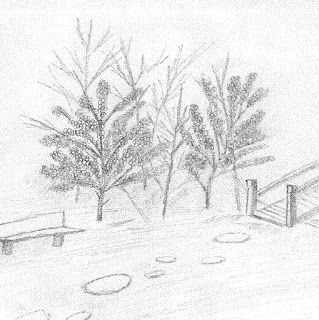A Boundless Moment by Robert Frost
He halted in the wind,
and — what was that
Far in the maples, pale, but not a ghost?
He stood there bringing March against his thought, And yet too ready to believe the most.
"Oh, that's the Paradise-in-bloom," I said;
And truly it was fair enough for flowers
had we but in us to assume in march
Such white luxuriance of May for ours.
We stood a moment so in a strange world,
Myself as one his own pretense deceives;
And then I said the truth (and we moved on).
A young beech clinging to its last year's leaves.
Far in the maples, pale, but not a ghost?
He stood there bringing March against his thought, And yet too ready to believe the most.
"Oh, that's the Paradise-in-bloom," I said;
And truly it was fair enough for flowers
had we but in us to assume in march
Such white luxuriance of May for ours.
We stood a moment so in a strange world,
Myself as one his own pretense deceives;
And then I said the truth (and we moved on).
A young beech clinging to its last year's leaves.
The poem is one of seasons changing and the cycle of life.
Each May the bloom comes out and brings life to the death of winter. The poem
is about a single moment when the characters see that life has changed. The
layers of meaning can be deep but on the surface it appears Robert Frost is
discussing nature and its cyclical momentum. Everything in nature moves through patterns.
The poem indicates that he is walking with someone. The
pastoral beauty of nature has caught their eye and they pause for just a
moment. They gaze into nature and its ever changing existence-a paradise of
bloom. The author discusses a piece of truth to his companion and both move
on. He feels as though he is in a strange world where pretenses fail our human
understanding of our place within it all.
In the last sentence we see a comment about a young beech
clinging to its last year’s leaves. It is possible to see this as how we always
cling to what was before and fail to embrace the new. No matter how much we
cling to the past change sweeps up us all. We can’t live in the past. The tree
with a single leaf could be a metaphor for how we try and maintain our youth
and past, but life will make it all fall away. Humans and nature are part of the
very same existence.

